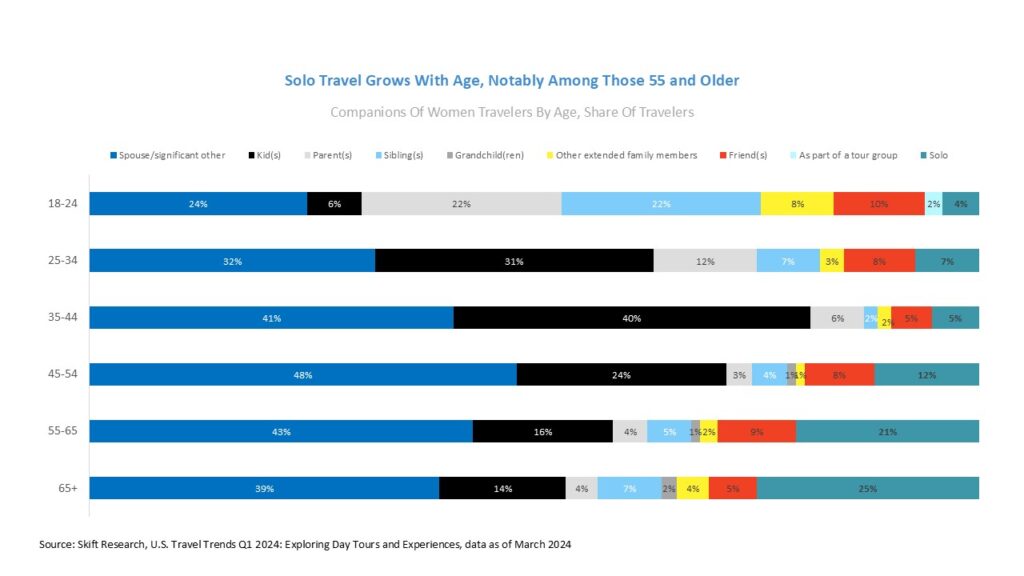The Rise of Senior Women Travelers – and How the Industry Is Responding – Skift Travel News
3 min readSkift Take
Older women are traveling more and there are plenty of opportunities for the hotels and airlines to adapt their product offerings.
In a new Skift Research report, “The Woman Traveler: Key Data and Insights,” we uncovered a trend reshaping the travel industry: The rise of solo travel among elderly women.
While only 4% of young adults aged 18 to 24 embark on solo trips, this figure leaps to 25% for those aged 65 and above. This growing trend reflects a powerful change in the aspirations and behaviors of older women, fueled by a desire for independence, self-discovery, and the freedom to explore the world on their own terms.

Why Solo Travel Appeals to Older Women
Solo travel holds a unique allure for older women. Retirement opens doors for older women, removing the constraints of professional commitments and family responsibilities.
According to recent research on solo women travelers, women primarily travel solo to enjoy freedom and flexibility (87%), escape routine and responsibilities (81%), focus on relaxation and self-care (78%), and challenge themselves (78%).
Additionally, 53% travel solo because they lack a travel companion. These motivations have remained consistent across all age groups since 2020.
Aging Populations and Travel Aspirations
Globally, the aging population is a powerful demographic shaping the travel industry. Elie Maalouf, CEO of IHG, highlighted this trend, emphasizing that retirees today are healthier, wealthier, and more eager to travel than previous generations. Regions like North America, Europe, and China are at the forefront of this change, with retirees viewing travel as a priority investment in their well-being and happiness.
Safety, accessibility, and the opportunity for meaningful connections are key priorities for senior travelers.
The travel industry has increasingly adapted to meet the unique needs of this demographic, incorporating these priorities into their services. From specialized senior lounges and accessible transport options to personalized concierge services, airports and hotels are creating environments that prioritize comfort and support.
This demographic’s desire for independence is met with services like customized itineraries, wellness retreats, and community-focused experiences.
For example, in China, the aging population is reshaping the travel market. Trip.com Group reported spending of RMB 1.6 billion (approximately $224.6 million) from senior travelers, and the company has responded by launching the “Old Friends Club,” targeting travelers aged 50 and above.
There is also a shift from group tours to customized experiences, with older adults increasingly seeking quality and unique travel offerings.
The Hospitality Industry’s Response
Hotels are focusing on safety and convenience by offering accommodations with features like 24/7 staff availability, elevators, ramps, and grab bars.
Marriott’s Senior Discount Program provides discounted rates and flexible booking options. IHG’s senior discount program offers special rates for travelers aged 62 and over, along with perks like extra benefits for IHG One Rewards members, including free Wi-Fi and late checkouts. Additionally, IHG Hotels & Resorts is promoting “retirementmoons” for retirees.
Airports around the world are also adapting to ensure a smoother journey for senior travelers.
Munich’s “Assisted Travel” program provides door-to-door service, guiding elderly passengers through the airport with ease. In Tokyo, Haneda Airport uses robotic assistants. Schiphol Airport in Amsterdam claims it has the world’s first “Dementia Friendly” airport.
Empowering Elderly Women Through Hospitality and Travel Insurance
Travel insurance has become key for senior travelers due to concerns about medical emergencies, trip cancellations, and age-related health issues. With the senior citizen travel insurance market projected to grow to $16.7 billion globally by 2032 at a compound annual growth rate (CAGR) of 18.3%, the industry is recognizing the unique needs of this demographic.
For example, Allianz Travel Insurance has designed its policies to cater specifically to older travelers. Its OneTrip Prime Plan provides benefits like trip cancellation, trip interruption, and emergency medical coverage, while also offering “Cancel for Any Reason (CFAR)” coverage. This option is particularly valuable for older women who may have uncertainties about their travel plans and want to ensure that they can cancel without losing significant amounts of money.
Allianz also offers preexisting condition coverage if added within 14 days of the initial deposit, addressing common health concerns that older travelers may have. By emphasizing safety, accessibility, and enriching experiences, travel providers and insurers like Allianz can empower older women to explore the world with confidence and independence.
Discover more from Slow Travel News
Subscribe to get the latest posts sent to your email.



